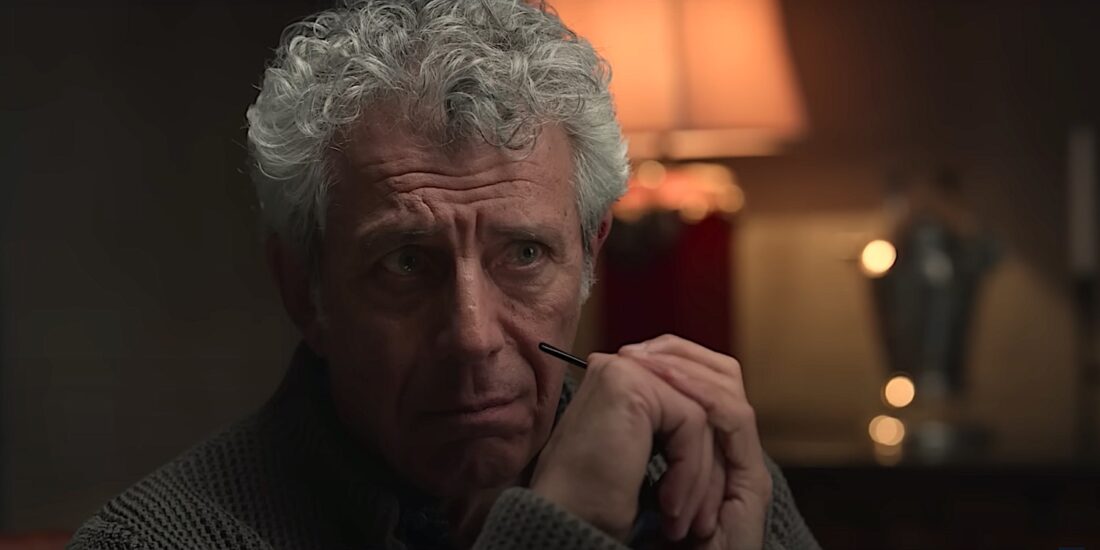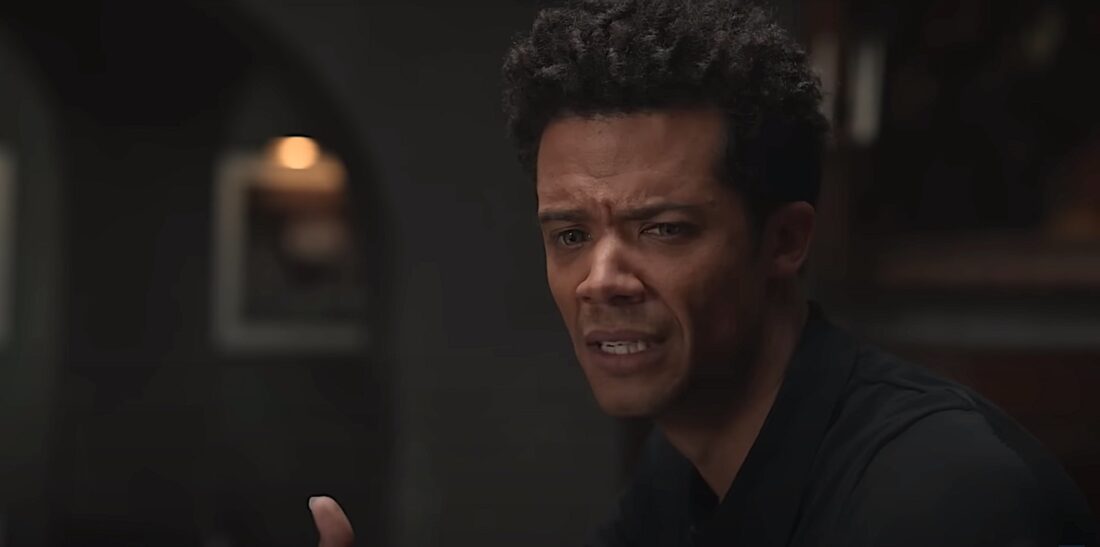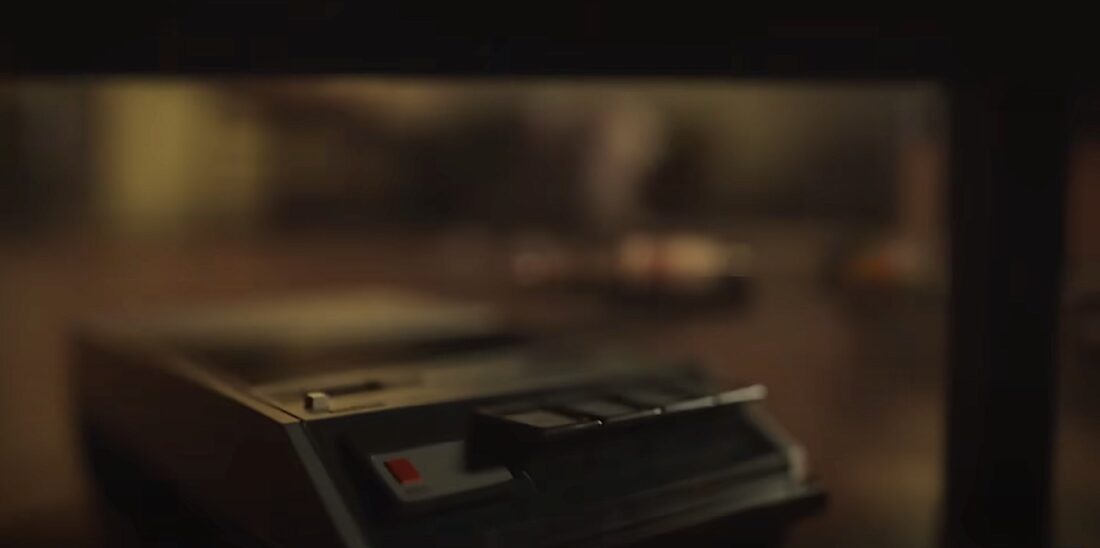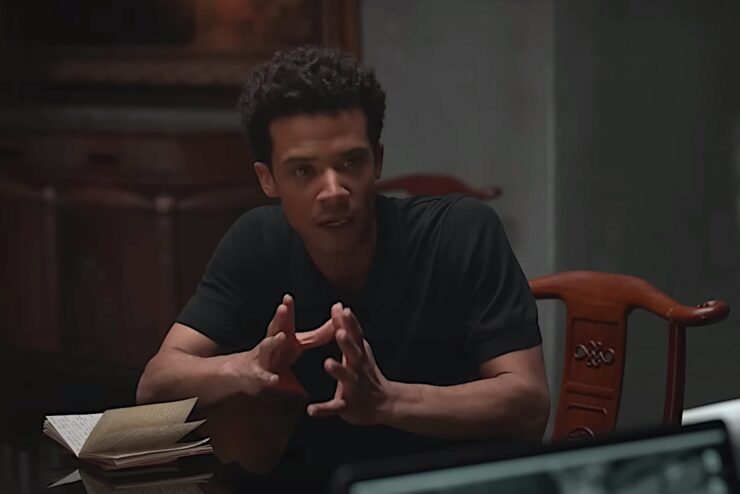“No vampire must commit to writing the history of the vampires.” This is presented by one vampire coven as the third vampiric law in Rolin Jones’ TV adaptation of Interview with the Vampire, but in the books it’s the fifth. In a later season, another character might present the law differently; depending which vampire you ask, details can get very slippery. That’s what makes Interview fascinating, the tug of war between its characters for control of the narrative.
Maybe that’s why there’s a law against vampires writing down their history?
Interview hasn’t just taken liberties with its source material, it takes a red pen to the book mercilessly, rewriting it almost completely—if there were laws for how to adapt the original, this show would surely have broken a few. But we’re not just throwing away the book; the earlier versions of this narrative are crucial to understanding its current iteration. Interview is a palimpsest of narratives, a conversation between drafts of the story and between the differing recollections of its characters. The viewer is left to make what they can of the contested text.
For those who don’t know, the original novel happens over the course of one night, when the vampire Louis de Pointe du Lac tells his life story to journalist Daniel Molloy, who he chose for unknown reasons (in the books). In Jones’ show, Daniel goes on to become a successful author, but never writes about Louis. The show’s action begins when, fifty years later, Louis contacts him again and offers to tell him the “real” story, so Daniel can finally write the authoritative account of Louis’s life.
As Hegel puts it, “the return to the book is also the abandoning of the book.” As you re-read, you destroy your previous interpretations of a book in your search for meaning in the present. Much of the second interview is spent on disputes about what Louis said on the original tapes, which acts almost too literally as a stand-in for Anne Rice’s book. Louis said he is over 200 years old in the original interview; now he’s 100 years younger. Louis was originally the owner of a plantation in the South, now he’s a Black brothel owner. And of course, Louis is never consistent in his depiction of Lestat, his lover and the man who turned him into a vampire.
Daniel’s questions are often the viewer’s: why is the show giving us this story about Louis now? What are we meant to think of the original?
According to Jacques Derrida, the “inventor” of deconstructive analysis, one can never truly know what an author “really” meant in their text. The text is the part of an artwork that can be experienced; the rest is interpretation by the viewer, which is an attempt at reconstructing that “real” aspect which can never be accessed. What Anne Rice “really” intended, what Louis “really” meant in the first interview, even what “really” happened when you and your last lover broke up—it’s lost to us forever. All we have is a palimpsest of our previous interpretations, never touching reality.
What I mean is, Interview is making a faithful adaptation of the book by returning to/ abandoning the book. It allows for the show’s queerness, its racial inclusivity, and all the other details that make it so squarely a work of its own, separate from the original. This show is talking about trauma, abuse, love, and grief in ways that not only go further than the books but actually comment on its source material. Daniel sardonically notes the warning signs of abuse as Louis tells the story of his relationship with Lestat, and brings up plot holes from Rice’s book as throwaway jokes. Readers of the books were probably aware their relationship was less than healthy, but they might not have thought that hard about it amid the other horrors in the story.

The themes of trauma and abuse are all the more palpable given that Louis and Daniel are unreliable narrators for themselves—Interview is more of a mind-fuck than a Christopher Nolan film (or like, his early work, anyway). The show’s second season has been promoted with the tagline “memory is a monster.” Memory is Louis’s biggest cop-out in the show, and one of the most crucial plot points: both Louis and Daniel can’t fully remember what happened that night when they first met. Maybe the interview can help them figure it out? The original doesn’t help; it ends where their memories do.
It’s revealed that Louis has memory gaps across his entire lifespan, and certain events have been wallpapered over in his mind with false narratives—the parts of the book that the show wanted to change. But this isn’t just the soap opera’s plot device of convenience: Louis has repressed some of his memories himself, but some have been erased or edited by his new vampire lover Armand. At this time Armand’s motivations may not be fully revealed, but he obviously doesn’t want Louis or Daniel to know that he tortured Daniel in front of Louis for days following the original interview—this is why neither of them remembers how the interview ended. (Okay, it is kind of a soap opera.)
The original Interview book also plays with Louis’ reliability as a narrator, mostly in making the reader wonder if Louis is lying to Daniel or to himself, whether he has motivations beyond his own sentimentality. Louis still at times seems to be hiding details from Daniel, but Daniel also helps him recover crucial memories of Claudia, a younger vampire he sees as a little sister. In both book and show, Louis appears to have repressed memories of Claudia because they were too painful, possibly because of the end of her story, which has only been hinted at in the show and which may or may not be the same as the books. This interplay of influences on Louis’s memory creates the stakes of the show.
Neurology tells us that memory literally is a palimpsest, even for those of us who haven’t had vampires meddle with our minds. Every time we remember something, we rewrite the memory in our minds—rewrite as in over-writing, reconstructing the memory anew. Louis does this in a very literal way, but it’s true in a mundane sense as well. The most key moments of our lives come to us through a glass darkly, warped by more recent events that preface our recollection. In a way, Louis only ever interacts with the interpretation of Lestat in his head, the way he does while daydreaming in certain scenes of the second season—and it’s the same for all of us.

“The moment you met her. All these years, drunk on the memory of its perfection. How shiny her lips. How instant your connection.” Jared Leto’s character in Blade Runner 2049 puts it thus to Harrison Ford, implying the love of his life was orchestrated for a larger purpose. Many sequels or reboots build on the original work, but Blade Runner undertakes the same re-contextualization, with the fabrication of memories being a foregrounded theme. None of us knows what really happened in our relationships, our lives—we just know what we remember, and what we remember is a text we are constantly rewriting, our brains reinterpreting the text to create a new text that we think is reality. There’s a grief in that; grief for the immediacy you will never have again, the person you can now only reconstruct from the text of memory.
“I can’t imagine you with all your complexity, all your perfection, all your imperfection,” says the main character of Inception to the dream version of his wife. “You’re the best I can do. But I’m sorry, you’re just not good enough.” At the end of our lives, when we retell our stories (either to someone else or to ourselves), all we’re left with is the ghosts in our memory. Is that what it means for memory to be a monster? Louis is obviously able to reconstruct a very convincing Lestat to converse with, but we, the viewers of the show, have literally never had a way to corroborate his story.
Maybe the other characters can shed some light on this, an external check to Louis’ fabrications. But beware: their viewpoints must be interpreted as well. Rice wrote one of the books from Lestat’s point of view, and other vampires get their own books too; it gives the impression of a set of primary sources the reader has to sift through. In the show Claudia’s diary is a primary source, which Daniel uses to fact-check Louis’ claims. When Daniel finds a chapter’s worth of pages ripped out of the diary, it is a mystery (for a time) who took those pages out—Claudia, Lestat, Armand, or Louis. But where in these sources is the truth? What are we looking for when we say that word?
When Armand joins the interview, a new and contentious POV enters the chat. At first, Armand pretended to be Louis’ servant Rashid; he is replaced in that capacity by “real Rashid” in Season 2. Armand (played by Assad Zaman, a heartthrob if I ever saw one) at first wants to be off the record, with Daniel striking his words from the palimpsest-text as soon as he speaks them. When Armand agrees to be part of the record, he and Louis often speak at the same time, their words blending into each other; it feels like an old married couple telling you how they met, but their intimacy has an antagonistic undercurrent to it. Louis finds out things about Armand during these interviews that he didn’t know for the seventy years they’ve been together. How disorienting that must be.
Derrida goes so far as to describe people as texts. As in, the tangible parts of a person allow you to form an interpretation of them, but their internal states aren’t accessible to you. Sometimes the person you interpreted as Rashid is really Armand, and the Louis you met has lived a drastically different life than he described to you, to both his and your surprise. This is what it’s like to have a relationship with someone, even when they’re right in front of you: like in Gone Girl, another canny film adaptation, you find yourself asking, “What are you thinking? How are you feeling? What have we done to each other?” Nick describes wanting to crack his wife’s lovely head to get answers, but none of us get to do that. Is there grief to be felt for people still in our lives? For our own selves, as we once understood them?

Interview is a story about text in this broader sense, with the stakes being the characters’ relationships as well as the larger text of the show. The characters, the writers, and past versions of the story vye for control of the text, but is there a definitive version of the text? How would we know if we found/created it? Maybe this is what’s at issue with every adaptation. Will the new narrative be faithful to its original, or like Louis with Lestat, will it kill its maker and leave it in a garbage dump? And when will the revisions end? Is Interview a project of “permanent revolution,” constantly re-writing both its past and its present?
“Diaries are companions of last resort. I have found one not made of paper and glue,” writes Claudia in her last diary entry. Now that she’s found a lover, she is bored of breaking the third vampiric law. Will Louis be able to lay his story to rest at some point, to continue his relationship with Armand with his past at peace? How long will he reinterpret events? Harrison Ford defies Jared Leto; laconically, he mutters, “I know what’s real.” In Inception, Cobb eventually abandons the spinning top that might tell him whether he’s returned to his real family or another dream. For Daniel and Louis, and also for Interview, just deciding what’s true might not be the answer.
I can’t pretend to know how even this season of Interview will end, let alone the show as a whole (it’s just been renewed for a third season!), but it will be interesting to see how this textual approach might potentially stretch past Louis’ interview. I hope for Claudia to “escape the narrative” as they say, and for Lestat to stop haunting it—and when I say “the narrative” I mean Louis’ mind as much as the show.
Interview‘s grapplings with truth and identity will need to come to some result before it can end. But maybe the grappling is the point of a relationship—the show’s relationship with its source material and our relationship with the show. Once something has ended, we’re left to re-interpret it forever. I can be satisfied with that, but I am thankful to puzzle out Interview’s mysteries for a little longer before it becomes part of the past.










